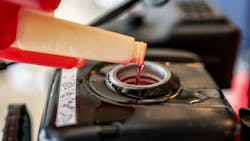Quality standards for diesel are notoriously broad, which means there are plenty of sub-par products out there that aren’t equipped to protect your machines.
No one wants to deal with fuel-related downtime, which is why treating regular No. 2 diesel with aftermarket additives has become such a common patch for many equipment owners. Among the most common aftermarket additives used are fuel stabilizers. But what exactly is a fuel stabilizer, and what should you consider when shopping for one? Here’s what you need to know.
For starters, there are technically two kinds of fuel stabilizers: injection stabilizers and storage stabilizers. Each plays an important role in increasing a diesel fuel’s performance.
Why does diesel need an injection stabilizer?
Just like the heart pumps blood to the body, injectors pump fuel to the engine. They do this by spraying a fine mist of fuel into the combustion chamber, where it’s ignited to create power. But turning fuel into a mist takes an immense amount of pressure — and often, a sub-par fuel isn’t up to the challenge.
Intense pressure means intense heat, which can break down a typical no. 2 diesel and leave harmful deposits on injectors. This chemical breakdown is known as coking, and if left untended, it can manifest until deposits have completely plugged your injectors — requiring expensive repairs and downtime.
An injection stabilizer helps to prevent coking and deposits. As a result, injectors remain clean and freely pumping—just like a healthy heart should.
Why does diesel need storage stabilizer?
More and more, equipment owners are buying their fuel in bulk and storing it until it’s needed. This can be a great strategy. By securing your supply, you don’t need to worry about time-consuming refills during planting and harvest. You can also stock up when demand is low to avoid the price spikes of peak season.
The trouble is that regular No. 2 diesel has an approximate shelf life of six months. Over time, temperature changes, varnish and gum buildup can all degrade a fuel as it sits in storage. That means if a fuel isn’t used in a timely manner, it’ll go to waste.
Unless it’s protected with a storage stabilizer, that is. Storage stabilizers extend a fuel’s shelf life—tolerating temperature extremes and reducing gum and varnish buildup. As a result, fuel can be safely stored for longer without going bad. What’s more, storage stabilizers can also help increase injector life and optimize fuel combustibility.
How to pick a diesel fuel stabilizer
Now comes the important part: determining what solution is right for you. There’s no shortage of options on the market. How are you supposed to know which product is best?
What’s more, there’s a host of other questions you’ll need to ask yourself. How often should you treat your fuel? Should you add your stabilizer on a full tank or empty? If one glug is good, is two better?
Long story short, when it comes to fuel stabilizers, there are many unknowns to going it alone. Instead of trying to doctor up a subpar fuel with an aftermarket stabilizer, consider using a Premium Diesel that has both injection and storage stabilizers built right in.
Injected at the terminal as part of an industry-leading, multifunctional additive package, the stabilizers inside Cenex Roadmaster XL and Ruby Fieldmaster give equipment all the same benefits without any of the guesswork of aftermarket options.
To learn more about how Roadmaster XL or Ruby Fieldmaster can help keep your operation going strong, contact your local Cenex dealer.
About the Author
Chad Christiansen
Product quality and additives manager
Chad Christiansen has a decade of experience in the cooperative energy business with a background in agriculture and natural resource management. He started his career in sales with CHS and has experience in the cooperative system. Chad is technical expert and product specialist for Cenex Premium Diesel, TOP TIER gasoline and E15 fuels. He holds a Bachelor of Science degree from Kansas State University and has worked with CHS since 2009.
